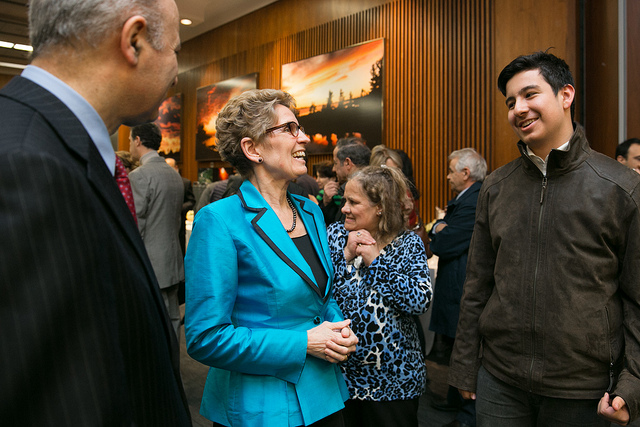Please help rabble.ca stop Harper’s election fraud plan. Become a monthly supporter.
Ontario Liberal insiders believed they were just going to get a few more votes than the Conservatives and this would just give them enough to hang on for another minority government.
None of them, and no one else for that matter, thought a Liberal majority was remotely possible. And it wasn’t. The Liberals’ share of the vote was only one per cent more than their share in the 2011 campaign, which landed them with their precarious minority. This time the votes fell in the right places, and the rest is history. (Of course if the Liberals wanted to be sore winners, they could point out that Bob Rae’s NDP in 1990 won less of the popular vote than Kathleen Wynne did on Thursday — 37.6 per cent compared to 38.6 — and emerged with a mind-boggling 74 seats, instead of Premier Wynne’s 59.)
But the Liberals’ luck is also Ontario’s luck. The Conservatives, and a good number of observers, believed Tim Hudak would emerge with the most seats, though not a majority. By parliamentary tradition, the Lieutenant-Governor would have been obliged to ask the last premier to form a government if she could; had Andrea Horwath agreed to support the Liberals — and now we’ll never know — the latter could have formed another minority. Yet as another way of scaring voters away from Mr. Hudak, Ms. Wynne took the dubious gamble of promising to advise the L-G to ask Mr. Hudak to form a government if he got more seats. He would have done so, found an excuse to force yet another election, and very possibly have emerged victorious. The consequences for the province are unthinkable. So lucky Ontario has been saved.
Mr. Hudak was not unlucky. He was the sole author of his own misfortune. He and his team headed off to Washington, met some of the most extreme Republican politicians and “thinkers,” and returned promising Ontario a full-blown Tea Party platform. It was a corporate fantasy come true and was soon blown out of the water. Rarely in Canadian history have so many independent experts agreed on the dishonesty and distortions of a party’s platform. Still, to be fair, it seemed that Mr. Hudak had managed to persuade the 36 per cent of voters who supported him in 2011 to stick with him again. At least so it seemed to virtually every pollster and every wise guy pundit — until election night. Somehow, fully five per cent of those supporters abandoned ship on election day, Mr. Hudak ending up more than seven per cent behind the Liberals. It was an unequivocal repudiation.
Ms. Horwath was mainly inept and a little bit unlucky. She increased the NDP’s vote from 2011 by one per cent and might have legitimately expected more seats in return. But it was not to be. Let’s be clear: her intention was honourable. Like Tom Mulcair in Ottawa, she understood that to increase the NDP’s vote, and give it any chance of forming a government, somehow the party’s appeal must be expanded. So far so good. But her execution was sloppy and incoherent. She alienated an important part of her base — always the wrong thing to do — without giving many potential new voters reason to support the party. It was an experiment gone wrong, with many lessons for the future.
It was of course yet another unlucky day for those who favour proportional representation. The Liberal majority with under 40 per cent of the vote is further testimony — as if we need any — that our first-past-the-post system is deeply, irreparably flawed. Problem is that governments who’ve just won majorities under the existing system are somehow not inclined to tamper with a good thing.
It was once again a very mixed bag of a night for the polling industry. After Alberta and British Columbia, they needed a better night than they got. Most polling companies showed the Conservatives, as already noted, at about 36 per cent; they weren’t even close. Most polls showed the NDP in the late stages at anywhere between 17 per cent and 30 per cent. It got 23.7 per cent. How can this not be a crisis for pollsters in general?
It was an unlucky night for strategic voting. Strategic voting is always a mug’s game since most people really don’t know what the best strategy is in any given riding. In any event, it’s not clear how it operated in Ontario, if it operated at all. The Liberals naturally worked very hard to appeal to New Democrats to vote Liberal to prevent a Hudak victory. But it’s not clear how effective the strategy was. So far as I can tell, it doesn’t appear that the Liberals gained from the NDP in the late stages. It was the Conservatives who lost most support at the end, though it’s not clear where that support went. Maybe in the end they too were turned off by Mr. Hudak’s plan and just stayed home.
Finally, this province just made history by electing as premier a woman who happens to be a lesbian, yet it’s barely of interest. Nor did the Conservatives ever attempt to make an issue of it. That means Ontario’s not just lucky. It’s blessed.
This article was originally published in The Globe and Mail.
Image: Flickr/PremierPhotos



